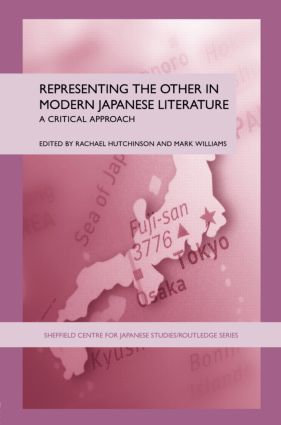Professor Sakaki's article "'There Is No Such Place as Home’: Gotō Meisei, or Identity as Alterity" was published in Representing the Other in Modern Japanese Literature: A Critical Approach. A summary of the book is below. Both the summary and the book cover on the right are courtesy of Routledge via Taylor & Francis.
Goto¯ Meisei (1932-99), like his world-famous contemporary Abe Ko¯bo¯ (192493), was a returnee from a former ‘colony’ of the Empire of Japan. For Abe, the original landscape was that of Manchuria. In Goto¯’s case it was the present-day North Korea where he was born and grew up. Having experienced the end of the Asia Pacific War at the age of thirteen, just as he planned to proceed to the Military Academy, Goto¯ hardly had any opportunity to develop a sense of belonging. The experience of living in an ethnically mixed environment and being forced to leave Korea, newly occupied by the Soviet Army, in order to ‘return’ to a Kyu¯shu¯ which didn’t feel like home inspired him with the recognition that there is indeed no set originary ethnic identity that endures. This idea recurs throughout his fiction produced in many stages, most notably reincarnating in a cluster of stories on life in an apartment megaplex (danchi), a place that he views as an incidental destination of drifters, or the exile land. His studies of Nikolai Gogol (Warai no ho¯ho¯, aruiwa Nikorai Go¯gori (The Method of Laughter, or Nikolai Gogol), 1981), Dostoevsky (Dosutoefusukii no Peteruburugu (The St. Petersburg of Dostoevsky), 1987), Ueda Akinari (Ugetsu monogatari kiko¯ (Literary Travels to Sites in The Tales of the Rain and Moon), 1975), Franz Kafka (Kafuka no meikyo¯ : Akumu no ho¯ho¯ (Kafka’s Labyrinth: The Method of Nightmares), 1987), Nagai Kafu¯ (many essays over a course of time), Tanizaki Jun’ichiro¯ (Kono hito o miyo (Ecce Homo), serialized in 1990) and other Japanese and non-Japanese writers are very effective in articulating the intangibility of one’s origin (and orientation). Overall, his case constitutes a valid antithesis to the theory of ‘Nihon kaiki’ or ‘the ultimate return to Japan’.
Publication Type
- Article



